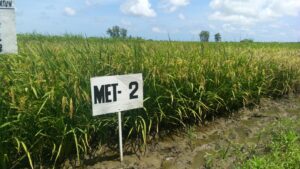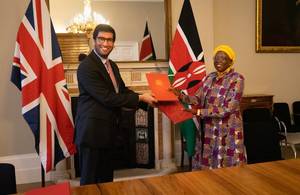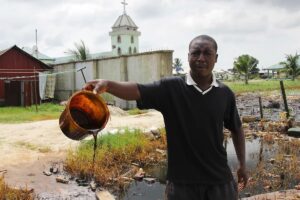- Abu Dhabi radiates optimism as over 300 startups join AIM Congress 2024
- TLcom Capital Raises $154 million in Funding to Boost Its African Growth
- Africa’s $824Bn debt, resource-backed opaque loans slowing growth — AfDB
- LB Investment brings $1.2 trillion portfolio display to AIM Congress spotlight
- AmCham Summit kicks off, setting course for robust future of US-East Africa trade ties
- Why the UN is raising the red flag on the UK-Rwanda asylum treaty
- Portugal’s Galp Energia projects 10 billion barrels in Namibia’s new oil find
- Wärtsilä Energy offers tips on how Africa can navigate energy transition and grid reliability
Opinion
- Artificial intelligence in Africa can potentially propel the fintech industry into a new era of financial inclusion.
- AI tools can analyse data from client discussions, producing legal documents in simple language and at a fraction of what it would typically take to draft a contract.
- Banks, for example, can make their services more affordable to their customers by rolling out AI-powered chatbots to handle routine queries while sparing them from having to travel to a bank branch.
It’s difficult to imagine a time before the widespread adoption of mobile technology in Africa – particularly where financial services are concerned. For millions of unbanked people, transactions were limited to cash, postal services or even the barter system.
Now, in much the same way as mobile payments completely disrupted the status quo, AI has the potential to propel the fintech industry into a new era of financial inclusion. And perhaps most exciting …
- One of the most important ways a fintech can listen to its customers is to gauge how they engage with its products.
- Having a deep understanding of customer needs results in innovative solutions.
All around the world businesses are pulling out the stops to achieve growth in what can best be described as challenging economic conditions. Africa is no exception. The continent has long been recognised for its immense potential, and as such businesses across sectors are investing heavily into the continent.
Advancements in technology make serving the unbanked and underserved populations in Africa more viable than ever before. However, that does not mean growth comes easily. It is a hyper competitive and complex environment where genuinely understanding your customer is key to growth.
Even with this textbook understanding, there is a strong urge to take the “build it and they will come” approach because we can get caught up …
- Namibia is fortunate to benefit from the experiences of other oil- and gas-producing states.
- The country’s oil and gas sector is still looking forward to reaching the production phase, but S&P Global analysts don’t anticipate Namibia’s first oil production will come until 2029.
- Further, the country’s first gas-to-power project is scheduled to begin in 2027.
Namibia’s energy sector is still looking forward to reaching the production phase — S&P Global analysts don’t anticipate Namibia’s first oil to come until 2029, and the country’s first gas-to-power project is scheduled to begin in 2027.
Ohio State Team Jersey
ohio state jersey
Ohio State Team Jersey
asu jersey
ohio state jersey
Iowa State Football Uniforms
detroit lions jersey
micah parsons jersey
micah parsons jersey
Iowa State Football Uniforms
fsu football jersey
OSU Jerseys
custom football jerseys
asu jersey
Before Namibia achieves these hotly anticipated milestones, Namibian lawmakers can implement thoughtful, …
I love football. And I love clever, secure, creative, impactful investment. The fact that most of what we find, and I personally invest in, has a meaningful and measurable impact on those who need a hand-up, and not a hand-out, is a constant source of joy to me.
Having followed football and my English team for more than 45 years I have been saddened to see the adverse effect that money has had on football – and the detrimental effect that money has had on the beautiful game at the lower levels and in leagues outside of Europe. But it is the huge amount of money that now washes through football that is offering me the chance to help to create soccer academies in East Africa – allowing young and talented African footballers to transform their lives and the lives of their families and communities; and investors to make very …
The business model for airlines has been fundamentally flawed for decades but the last 20 years or so have been particularly challenging.
Growing competitiveness, a roller coaster of fuel prices, labor unions, and especially the phenomenon of low-cost carriers have made it all the more difficult to reach positive earnings pretty much in every route.
With a number of countries sporting continental distances, Africa has been an exciting promise for air carriers, but not without its challenges. Poor infrastructure and the high cost of maintenance and logistics have plagued the development of an effective air grid in the continent. Nevertheless, a great opportunity remains.
At the beginning of the last decade, South African Airways was a dominant force, carrying some 9 million passengers yearly while Kenya Airways and Ethiopian Airlines combined were just shy of 6 million yearly passengers. However, poor management choices combined with borderline irresponsible behavior from …
On 1st of April, as I was publishing my Uniconization of African Fintech piece[1], Mastercard was busy announcing their $100 million investment into Airtel Money (Airtel Africa’s mobile money subsidiary) to acquire a minority position – half what TPG Capital did[2]. Even though I had gotten wind of the transaction knowing that Mastercard was already in bed with Airtel Money[3] – some part of me thought of it as an April fools joke…. On the 12th of April 2021, Mobile Telecom Network (MTN) announced the valuation of their mobile money business at $5 billion making it the 7th African fintech unicorn with plans to bring in minority shareholders before going public[4]. Given that Visa is already in bed with MPESA (Vodacom and Safaricom’s mobile money business)[5], it is a matter of time before Visa also invests. The unicornization …
Cash in lieu in insurance means where the insurance company exercises the option of giving you cash for repair of your car instead of them having it repaired for you. There are a number of ways an insurance company can settle a motor insurance claim: by having your car repaired, or by giving you compensation in case of total loss or giving you cash for repairs. Insurance companies are technically liable for poor car repairs should you suffer injuries as a result.
Thus for an insurance company to remove themselves from the latter kind of situation they should just be liable for the cost of repairs and not arranging for repairs. That is different in Kenya and elsewhere where insurance companies arrange for the cost of repair in a bid to save a few shillings. An insurance company can opt for …
For over a century, Kenya and the United Kingdom have enjoyed strong ties hinged on trust, enhanced cooperation and mutual benefit across key sectors, among them trade, tourism, security, health and education.
The UK views Kenya as a strategic partner due to her wealth of agricultural materials, booming services sector and for being a gateway to other markets in the East African community. It has therefore over the decades invested in growing Kenya to become the region’s economic powerhouse. Indeed UK remains one of the largest foreign investors in Kenya with a portfolio approximated at £2.7 billion. More than 200 British companies have set up shop in Kenya opening up the country to increased employment opportunities and economic growth.
Kenya on the other hand has found a key export market in the UK for its products, among them tea, coffee, flowers and other horticultural produce. For millions of farmers …
Sahera Sumar is the epitome of what a global citizen represents. Having travelled to over 25 countries and delivered programs to diverse industries, sectors and cultures, Sumar has become a beacon of strength, knowledge and hope for women all over the world.
Equipped with her passion for capacity building and her expertise in leadership, talent and organisational development, Sumar is set to embark on her next big project.
 The project; Worldwide SHEroes, will see successful global leaders engage, empower, enable and mentor women leaders; sculpting them into women who are admired or idealised for their courage, outstanding achievements, or noble qualities.
The project; Worldwide SHEroes, will see successful global leaders engage, empower, enable and mentor women leaders; sculpting them into women who are admired or idealised for their courage, outstanding achievements, or noble qualities.
Worldwide SHEroes will provide women around the world with a global network of mentors and leaders who will share their collective wisdom. The goal of the platform is to accelerate the journey of women into positions of leadership and influence while at the same time improving their economic equity …


























